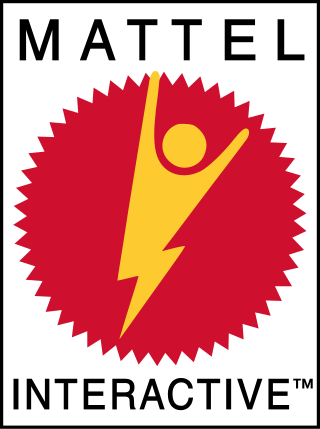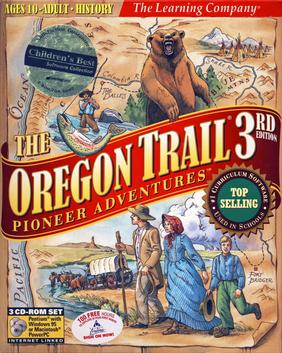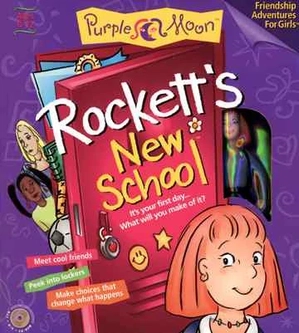Related Research Articles
Tiger Electronics Ltd. is an American toy manufacturer best known for its handheld electronic games, the Furby, the Talkboy, Giga Pets, the 2-XL robot, and audio games such as Brain Warp and the Brain Shift. When it was an independent company, Tiger Electronics Inc., its headquarters were in Vernon Hills, Illinois. It has been a subsidiary of Hasbro since 1998.

Danielle Bunten Berry, formerly known as Dan Bunten, was an American game designer and programmer, known for the 1983 game M.U.L.E., one of the first influential multiplayer video games, and 1984's The Seven Cities of Gold.

Gremlin Graphics Software Limited, later Gremlin Interactive Limited and ultimately Infogrames Studios Limited, was a British software house based in Sheffield, working mostly in the home computer market. Like many software houses established in the 1980s, their primary market was the 8-bit range of computers such as the ZX Spectrum, Amstrad CPC, MSX, Commodore 16 and Commodore 64. The company was acquired by French video game publisher Infogrames in 1999 and was renamed Infogrames Studios in 2000. Infogrames Studios closed down in 2003.

FIFA: Road to World Cup 98 is a football video game developed by EA Canada and released by Electronic Arts in 1997. It is the fifth game in the FIFA series and the second to be in 3D on the fifth generation of video game consoles. A number of different players were featured on the cover, including David Beckham in the UK, Roy Lassiter in the United States, Mexico and Brazil, David Ginola in France, Raúl in Spain and Portugal, Paolo Maldini in Italy, and Andreas Möller in Germany. FIFA 98 was the last FIFA game released for the Sega Genesis, Sega Saturn and the Super Nintendo Entertainment System (SNES).

FIFA 2000 is a football simulation video game developed by EA Canada and published by Electronic Arts. It was the seventh game in the main FIFA series. The game was released for Microsoft Windows and PlayStation. A version for the Game Boy Color was developed by Tiertex Design Studios and published by THQ.

Labyrinth: The Computer Game is a graphic adventure game developed by Lucasfilm Games and published in 1986 by Activision. Based on the fantasy film Labyrinth, it tasks the player with navigating a maze while solving puzzles and evading dangers. The player's goal is to find and defeat the main antagonist, Jareth, within 13 real-time hours. Unlike other adventure games of the period, Labyrinth does not feature a command-line interface. Instead, the player uses two scrolling "word wheel" menus on the screen to construct basic sentences.

Brenda Laurel is an American interaction designer, video game designer, and researcher. She is an advocate for diversity and inclusiveness in video games, a "pioneer in developing virtual reality", a public speaker, and an academic.

Michael Owen's WLS 2000 is an association football video game developed by Silicon Dreams Studio and published by THQ for the Nintendo 64. Released on 24 September 1999, the game stars English footballer Michael Owen. It is the third and final game in the World League Soccer series after World League Soccer '98 and Michael Owen's World League Soccer '99.
Purple Moon was an American developer of girls' video games based in Mountain View, California. Its games were targeted at girls between the ages of 8 and 14. The company was founded by Brenda Laurel and others, and supported by Interval Research. They debuted their first two games, Rockett's New School and Secret Paths in the Forest, in 1997. Both games were more or less visual novels and encouraged values like friendship and decision making. Purple Moon's games were part of a larger girl games movement in the 1990s, initiated largely by the surprise success of Mattel's 1996 CD-ROM game Barbie Fashion Designer.

Mattel Interactive was a video game publisher and software distributor.

The American Girls Premiere is an educational computer game developed and published by The Learning Company for American Girl. The game allows players to create theatrical productions featuring characters from American Girl's Historical collection, along with scenes and other elements unique to each of the girls' respective time periods.
Massively multiplayer online real-time strategy game (MMORTS) mixes the genres of real-time strategy and massively multiplayer online games, possibly in the form of web browser-based games, in which a very large number of players interact with one another within a virtual world. Players often assume the role of a general, king, or other type of figurehead leading an army into battle while maintaining the resources needed for such warfare. The titles are often based in a sci-fi or fantasy universe and are distinguished from single or small-scale multiplayer RTSes by the number of players and common use of a persistent world, generally hosted by the game's publisher, which continues to evolve even when the player is offline.

The Oregon Trail 3rd Edition is the second sequel to the 1985 edutainment video game The Oregon Trail after Oregon Trail II. It was developed by MECC and released in 1997.

The D.I.C.E. Awards is an annual awards show in the video game industry, and commonly referred to as the video game equivalent of the Academy Awards. The awards are arranged by the Academy of Interactive Arts & Sciences (AIAS) and held during the AIAS' annual D.I.C.E. Summit in Las Vegas. "D.I.C.E." is a backronym for "Design Innovate Communicate Entertain". The D.I.C.E. Awards recognizes games, individuals, and development teams that have contributed to the advancement of the multi-billion dollar worldwide entertainment software industry.

Barbie Fashion Designer is a dress-up computer game developed by Digital Domain and published by Mattel Media for Microsoft Windows and Mac OS in 1996. The game allows players to design clothing and style outfits. Players can then print off their designs and create clothing for their real-world Barbie dolls. Barbie Fashion Designer was the first commercially successful video game made for girls. After its success, many other girl games would be made, leading to the girls' games movement.
Let's Talk About Me is a 1995 girl-oriented activity centre video game developed by GirlGames Inc. and team smartyPants!, and published by Simon & Schuster Interactive. It was released on Macintosh, Windows, and Windows 3.x. A sequel entitled Let's Talk About Me Too was released in 1997.

Rockett's New School is a 1997 girl-oriented video game developed by Silicon Valley–based Purple Moon. It was directed by Brenda Laurel.
Secret Paths in the Forest is a video game developed by Purple Moon. The game was designed to be episodic, and spawned sequels entitled "Secret Paths to Your Dreams" and "Secret Paths to the Sea”, which were released under Mattel after its 1999 acquisition of Purple Moon.

Rugrats Adventure Game is an educational adventure point and click video game based on the Rugrats television series released for Microsoft Windows and Macintosh on September 30, 1998. It was developed and published by Broderbund. The game follows Tommy Pickles and friends Chuckie, Phil, and Lil as they try to rescue Tommy's beloved toy Reptar from being thrown out as garbage. The game incorporates point and click gameplay, with characters and objects appearing in different locations even after the player has visited them once. Angelica, the series' main antagonist, appears in the game to help further the story and ultimately become the game's main villain.
References
- 1 2 Hafner, Katie (10 September 1998). "Girl Games: Plenty And Pink". The New York Times.
- 1 2 3 Kocurek, Carly A. (9 February 2017). Brenda Laurel: Pioneering Games for Girls. Bloomsbury Publishing USA. ISBN 9781501319792 – via Google Books.
- ↑ Laurel, Brenda (2 April 2018). Utopian Entrepreneur. MIT Press. ISBN 9780262621533 – via Google Books.
- 1 2 "Q&A with Brenda Laurel: We "brought girls roaring into the online game space"". 2 March 2009.
- 1 2 "Battle Creek Enquirer from Battle Creek, Michigan on October 13, 1998 · Page 31". 13 October 1998.
- ↑ Jonric, Richard Aihoshi- (1 May 2002). "Sarah Stocker (Stormfront Studios) Interview".
- ↑ Kutcher S (May 2011). "Stuck on screens: patterns of computer and gaming station use in youth seen in a psychiatric clinic". Journal of the Canadian Academy of Child and Adolescent Psychiatry. 20 (2): 95. PMC 3085683 . PMID 21541097.
- ↑ "Second Interactive Achievement Awards - Personal Computer". Interactive.org. Academy of Interactive Arts & Sciences. Archived from the original on November 4, 1999. Retrieved 28 December 2022.